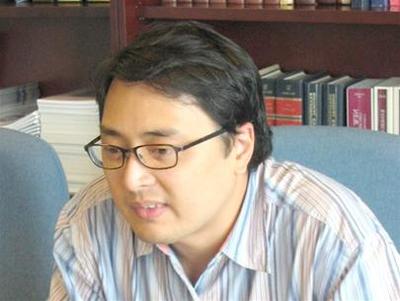According to ‘Article 19’, Le Cong Dinh (on the picture, right below) is a respected Vietnamese lawyer who has defended labour rights and democracy activists, and bloggers. He has also been an outspoken proponent of political pluralism and freedom of expression.
Dinh (on the picture, right below) is a respected Vietnamese lawyer who has defended labour rights and democracy activists, and bloggers. He has also been an outspoken proponent of political pluralism and freedom of expression.
Criminal Code for political opponents
Dinh was joined in the dock by Tran Huynh Duy Thuc, below, named by the  media as an internet entrepreneur, alongside Nguyen Tien Trung and Le Thang Long, in a trial lasting only one day. The four were arrested last June initially under the charge of spreading anti-government propaganda; they were later charged and convicted under the more severe Article 79 of the Criminal Code that prohibits “activities aimed at subverting the people’s administration”. There are signs that the authorities are increasingly using Article 79, which allows for the death penalty, to prosecute political opponents.
media as an internet entrepreneur, alongside Nguyen Tien Trung and Le Thang Long, in a trial lasting only one day. The four were arrested last June initially under the charge of spreading anti-government propaganda; they were later charged and convicted under the more severe Article 79 of the Criminal Code that prohibits “activities aimed at subverting the people’s administration”. There are signs that the authorities are increasingly using Article 79, which allows for the death penalty, to prosecute political opponents.
Thuc received the longest sentence of 16 years; Dinh and Long were each sentenced to five years, and Trung, below, seven years.
Chilling effect on freedom of expression
‘Article 19’ believes that these convictions will have a chilling effect on freedom of expression in Vietnam. The fate of these four men must be viewed in the context of the recent convictions of other pro-democracy advocates, the arrests of bloggers and the blocking of the social networking site Facebook.
“The ability to hold and express different political views is central to democracy,” says Dr Agnès Callamard, Executive Director of ‘Article 19’. “The abuse of criminal statutes for the prosecution of individuals who oppose the government goes against Vietnam’s stated commitment to human rights and freedom of expression, as set out in the International Covenant on Civil and Political Rights to which Vietnam acceded in September 1982.
‘Article 19’ is an independent human rights organisation that works around the world to protect and promote the right to freedom of expression. It takes its name from Article 19 of the Universal Declaration of Human Rights, which guarantees free speech.




